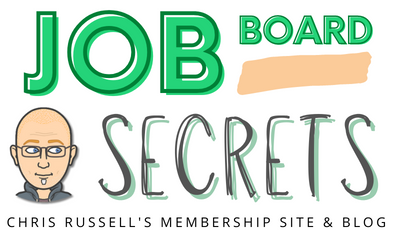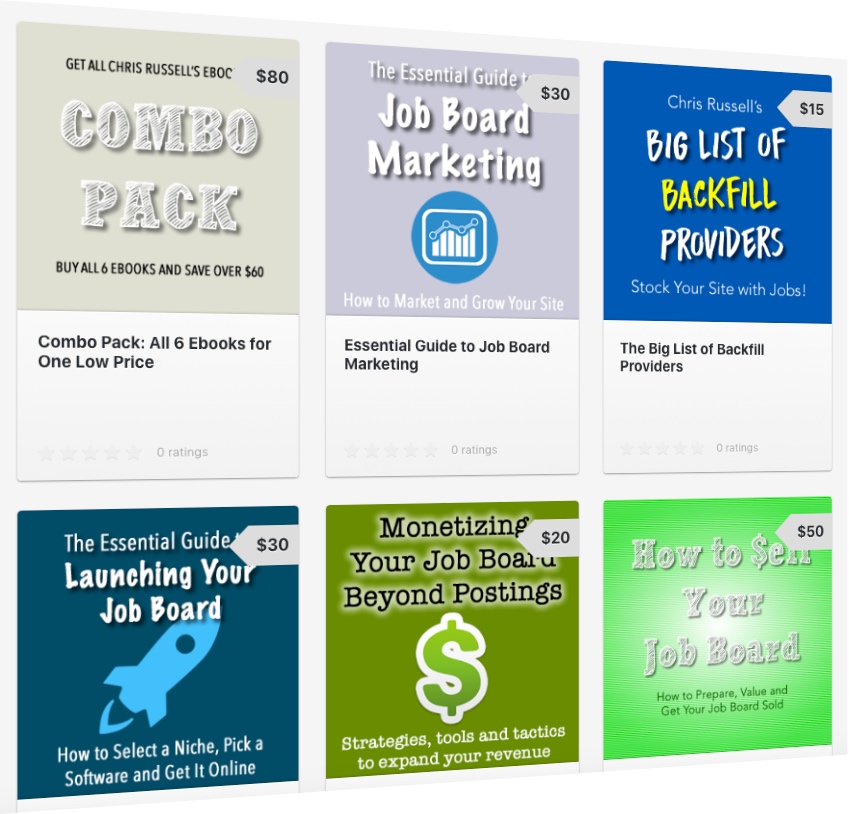- Failure to understand the concepts of Internet marketing
- Failure to understand the market/niche you are entering
- Poor web design
- Failure to explain the site’s value proposition
But in every industry, opportunities to succeed are there. You just have to pick the right niche and offer a more compelling product.
This document will focus on the sales strategies for a niche job board.
Positioning Your Job Board
Every job board should have a reason to post jobs on it. For niche and regional sites that reason is self explanatory. The rise of local and niche job boards over the past 5 years is no accident. They work, and that reason is all about the focus and quality results they deliver. The reason to post on your site should be clearly expressed to potential clients on your home page and reinforced throughout the employer sections of the site.
Here are some reasons why niche job boards are popular:
Forrester Research: “Local Sites Matter. Geography is more important to job seekers than industry focused sites. Monster.com is the most popular career site, but local sites place second and fourth in usage.”
Weddles.com: “These (local) Web-sites offer focused recruiting opportunities within specific geographic areas. Some concentrate on unique metropolitan districts while others have a broader, regional span. In either case, they enable you to reach large concentrations of prospective candidates for positions where relocation support is not available or a local background is important to successful job performance.”
CollegeRecruiter.com: There are several benefits to using niche/local job boards. First, little to no advertising money is wasted targeting unqualified candidates. Because the high profile, general boards target all candidates, the result is that the vast majority of the candidates using those boards will not be interested in the position posted by the employer because it falls outside of their career path, geographic preference or skill level.
By posting the position to the appropriate niche board, virtually all of the candidates using that niche/local board will be qualified for the position. As a result, even if the site has a small fraction of the traffic of the high profile, general board, the number of qualified candidates using the niche board tends to be higher. Second, the cost to post a position to a niche/local board is usually far less.
When listing the benefits of your site to employers, use quotes like this to give the recruiter “piece of mind” that their ad dollar will not go to waste. Remind them constantly that your site is not like Monster or the other big guys. Your site is more targeted, therefore they’ll get more qualified candidates.
Understanding Your Target Audience
There is a range of people who post jobs online. This includes a recruiting firm, an employer (small/med/large) or recruitment ad agencies such as TMP, Bernard Hodes and Shaker. The agencies write the ad & post jobs on behalf of their clients who are mainly large corporations.
Third party recruiters tend to post a lot of jobs online. Some job sites are dominated by their ads.
When employers post jobs, it can be done by a variety of folks from the Executive Assistant to the hiring manager to the HR person. At small companies it is mostly the owner who posts the ad.
Where to Find Leads
Fortunately finding leads is a fairly easy task in the job search industry. All you have to do is look at your competitor’s listings to see who’s hiring. The big job job boards: Monster, CareerBuilder, Indeed.com and SimplyHired offer gold mines of fresh hiring leads. Many times you can even see the name, email or fax number of the hiring company. Grab it when you can. Then target sales campaigns to that lead via email, fax or sales letter.
For a more proactive approach to sales look for potential employers by targeting them through social media sites and other industry lists. Just as Linkedin provides a way for recruiters to source candidates online, the reverse is also true. You can find these recruiters through the advanced search filters or messgage them directly by joining the same groups they belong to. Best of all its free. You dont even need to pay for an upgraded Linkedin account.
Another site for finding recruiter names is Jigsaw.com. It’s a giant database of contacts uploaded by business people across the country. It offers a multitude of ways to query just the right individuals such as by job title and function.
You can also look for specific industry mailing lists that you can buy.
When to Sell
Generally you’ll do most of your business between the hours of 9am and 6pm. That is when most recruiters, HR people and business owners post their jobs. The weekends will bring a job or two but don’t expect much activity. Tuesdays are probably the most active day of the week in terms of site traffic and sales.
TIP: avoid cold calling/emailing on mondays. People are just getting ready for the week ahead and catching up on their tasks. Your call or message will generally be ignored.
The sales cycle is usually quick or may take a week or two if that particular employer has not used you before. You may get some recruiters asking for ‘free trials’. Try to avoid doing this as much as possible unless its a client that you particularly covet. Steer them towards a discounted rate by offering them a coupon instead.
Seach Engine Marketing
Any good job board should also invest in SEM or Search Engine Marketing. This means buying keyword ads on the major search engines: Google, Bing and sites like Facebook. You pay them a certain amount each month or day and they send you a certain amount of click-through traffic.
Google Adwords: https://adwords.google.com/select/
Bing: http://advertising.microsoft.com/
Facebook Ads: http://www.facebook.com/advertising/
| Facebook Ad Sample
|
Using SEM to advertise is the equivalent of a real sales person. It is a must use tool for any job board that wants to attract postings.
The best part is you can set a budget and buy clicks on the cheap. You can expect to pay between .10 and .50 cents per click for most job related keywords. Certain keywords like ‘nursing jobs’ can be more expensive because of the competitive nature of that candidate segment. Nurses are much harder to find than Retail Sales Associates. So your advertising costs will vary based on the markets you serve.
Offline Sales Tactics
Direct Mail: Tactics such as postcard marketing and sales letters can be of great value in selling job postings. As you gather leads, put them into a contact database so you can market to them later on.
The above postcard was printed by 48hourprint.com. Its a great site for getting sales materials created.
Job Fairs: consider hold your own job fair, networking event or pink slip party. These are a great way to bring people together and get your name in front of potential job seekers and candidates.
Also check out when your local college is holding their job fair. You can purchase a table to promote your site along with other employers.
TIP: every industry has its share of events. Find the ones relevant to your site and market your site in person. Its a great branding opportunity.
Cold Calling: Many new job boards will face obstacles when it comes to cold calling for sales. If you have a new site, chances are you don’t have much traffic yet. The employer will know that so be prepared to answer questions like ‘how much traffic do you have?’ or ‘how do I know your site is any good?’.
They ask these questions because they want to know why they should spend money with you. If your site is new, you probably wont be able to counter their argument with a good answer. Therefore you may want hold-off on cold calling until you have some traction in the marketplace. Concentrate on SEM first.
However if you are a publisher or association who has just put a job board on their existing website, then you can leverage your existing user base to ramp up sales. Have your sales people start dialing.
How You Should Price Your Site
The past few years have seen a downward pressure on job posting prices. The recession along with new tools such as social media & craigslist have forced many job sites to lower their prices in order to compete with these free/low-cost tools.
New job boards coming online today are better off competing on price. That means having the lowest prices in your niche. Lower prices will enable you to to siphon off market share from competitors. Starting out with lower prices will also allow you to raise them over time.
Local job board prices can range from $10 to $200. The big boards like Monster, Dice, CareerBuilder charge close to $400 or more per posting. As a niche board you cant have the same pricing structure. You need to be a low cost alternative. The most typical pricing for a job posting on a local board is $99 for 30 days.
Some association & publisher job boards may be able to charge even higher. It really depends on your existing audience, candidate pool and competition. If you are in an industry with hard to find talent whose salaries are 100k or more you may be able to charge as much as $500-$1,000 per posting.
Product Offerings
Job boards should offer a variety of posting packages from single postings to unlimited subscriptions. Discounted rates should be given for purchasing multiple job postings. Jobtarget customers can create and offer all kinds of products and services through your partner admin.
You should also offer up-sells such as ‘Featured Jobs’ or logos. Sell access to the resume database. Although don’t expect resumes to generate much income.
Customer Relationships
One of the keys to job board success is to get repeat clients. You’ll achieve this if you pamper your good clients. Add value. Over deliver. They’ll come back again and again if they feel you give them value and the candidates they seek.
Establish personal relationships with them over time. Let them know there is a ‘person behind the job board’ who cares about their recruiting needs. Offer them recruiting advice, help them write their job descriptions, refresh their jobs. They will appreciate this assistance. Over time they will come to trust your site as a needed resource.
What to Expect (the first year)
There are many factors that go into determining how successful a job board can become. Design of your site, the industry, the competition each play a part. But just beware your site is unlikely to start making any real money until 1 year or later.
The industry is mature. There are already multiple job boards for each industry. But that does not mean you cant make money. You just need to pick the right niche and get to work. Generating revenue of $5k to 25k is reasonable to expect.
After 1 year, a typical niche job board might have about 5,000 – 10,000 monthly users and attract 3-10 postings per month. In addition to postings, there is also the potential of earning revenue from Google Adsense and money from clicks generated by an Indeed or SimplyHired backfill. Additional revenue sources like this will go a long way towards adding to your bottom line.
Example: JobsinWindPower.com, a niche board that serves the wind power industry, earns about $70 per month in backfill clicks and approximately $150 in Adsense revenue per month. Average that out to 12 months and they’re earning another $2,600 per year. Plus whatever they get in postings.
Job boards that generate more than six figures in sales are generally ones that have been around for a long time (5-10 years). Examples of these sites may be: MarketingJobs.com, EmployeeBenefitsJobs.com, CollegeRecruiter.com and AllCountyJobs.com (network).


